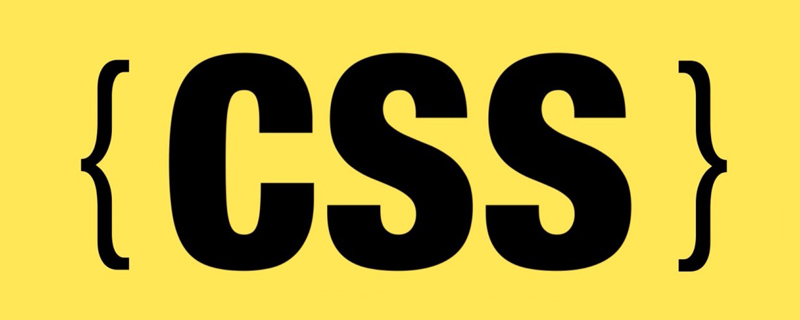 Web Front-end
Web Front-end JS Tutorial
JS Tutorial HTML, CSS, and jQuery: A technical guide to implementing image tile layouts
HTML, CSS, and jQuery: A technical guide to implementing image tile layouts
HTML, CSS and jQuery: Technical Guide to Implementing Image Tile Layout
Abstract: This article will introduce how to use HTML, CSS and jQuery to implement image tile layout . By using these techniques, you can create a beautiful and professional web layout to showcase your graphic artwork, product images, or any other images that require tiling. This article will provide you with a detailed technical guide and provide specific code examples to help you get started creating your own image tile layouts.
- HTML Layout
First, we need to create a basic HTML layout to accommodate our images. In this example, we will use a div container to contain all the images. You can change and adjust it to suit your needs.
<!DOCTYPE html>
<html>
<head>
<style>
.container {
display: flex;
flex-wrap: wrap;
justify-content: center;
}
.container img {
width: 200px;
height: 200px;
margin: 10px;
}
</style>
</head>
<body>
<div class="container">
<!--在这里插入您的图片-->
<img src="/static/imghwm/default1.png" data-src="image1.jpg" class="lazy" alt="Image 1">
<img src="/static/imghwm/default1.png" data-src="image2.jpg" class="lazy" alt="Image 2">
<img src="/static/imghwm/default1.png" data-src="image3.jpg" class="lazy" alt="Image 3">
<img src="/static/imghwm/default1.png" data-src="image4.jpg" class="lazy" alt="Image 4">
<img src="/static/imghwm/default1.png" data-src="image5.jpg" class="lazy" alt="Image 5">
<img src="/static/imghwm/default1.png" data-src="image6.jpg" class="lazy" alt="Image 6">
</div>
</body>
</html>In the above code, we create a div container with the container class and use the display: flex property of CSS to make it a flex container. flex-wrap: The wrap attribute will cause the image to automatically wrap in the container to adapt to changes in page width.
- CSS Style
In the above HTML code, we also define a CSS style that applies to all images. In this example, we set the width, height, and margins of the images so that they line up the way we want them to. You can customize it according to your needs.
.container img {
width: 200px;
height: 200px;
margin: 10px;
}- jQuery Tile Layout
Now, we will introduce how to use jQuery to implement tile layout. First, you need to add a link to the jQuery library in your web page. You can download the latest version of the jQuery library from the official website (https://jquery.com/) and link it to your HTML file.
<!DOCTYPE html>
<html>
<head>
<script src="https://code.jquery.com/jquery-3.6.0.min.js"></script>
<style>
.container {
display: flex;
flex-wrap: wrap;
justify-content: center;
}
.container img {
width: 200px;
height: 200px;
margin: 10px;
}
</style>
<script>
$(document).ready(function(){
// 获取容器和图片对象
var container = $(".container");
var images = container.find("img");
// 将图片按照平铺方式排列
function tileLayout() {
var containerWidth = container.width();
var imageWidth = images.eq(0).outerWidth() + 20; // 加上外边距
var numPerRow = Math.floor(containerWidth / imageWidth);
for (var i = 0; i < images.length; i += numPerRow) {
images.slice(i, i + numPerRow).wrapAll('<div class="row"></div>');
}
}
// 页面加载完成后进行排列
tileLayout();
// 窗口大小改变时重新排列
$(window).resize(function(){
container.find(".row").unwrap();
tileLayout();
});
});
</script>
</head>
<body>
<div class="container">
<!--在这里插入您的图片-->
<img src="/static/imghwm/default1.png" data-src="image1.jpg" class="lazy" alt="Image 1">
<img src="/static/imghwm/default1.png" data-src="image2.jpg" class="lazy" alt="Image 2">
<img src="/static/imghwm/default1.png" data-src="image3.jpg" class="lazy" alt="Image 3">
<img src="/static/imghwm/default1.png" data-src="image4.jpg" class="lazy" alt="Image 4">
<img src="/static/imghwm/default1.png" data-src="image5.jpg" class="lazy" alt="Image 5">
<img src="/static/imghwm/default1.png" data-src="image6.jpg" class="lazy" alt="Image 6">
</div>
</body>
</html>In the above code, we use jQuery's document ready event $(document).ready(function(){}) to ensure that the page is fully loaded before executing our code. First, we obtained the container and image objects, and defined a function named tileLayout(), which is used to wrap the image in a tiled manner in a <div> element. <p>After the page is loaded, we first call the <code>tileLayout() function to perform a layout. Then, we use the $(window).resize() event to rearrange the images when the browser window size changes.
Summary:
By using HTML, CSS and jQuery, we can easily implement image tile layout. By using HTML's <div> container and CSS's <code>display: flex property, we can create an automatically adapting layout. By using jQuery and some simple JavaScript code, we can dynamically adjust the layout of the image based on the page width. I hope this article will be helpful to you in implementing image tile layout!
The above is the detailed content of HTML, CSS, and jQuery: A technical guide to implementing image tile layouts. For more information, please follow other related articles on the PHP Chinese website!
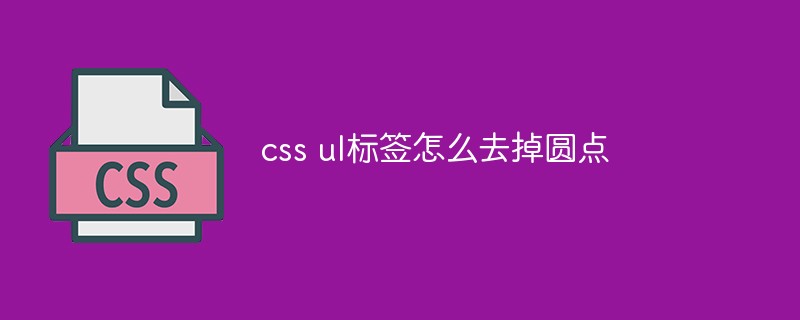 css ul标签怎么去掉圆点Apr 25, 2022 pm 05:55 PM
css ul标签怎么去掉圆点Apr 25, 2022 pm 05:55 PM在css中,可用list-style-type属性来去掉ul的圆点标记,语法为“ul{list-style-type:none}”;list-style-type属性可设置列表项标记的类型,当值为“none”可不定义标记,也可去除已有标记。
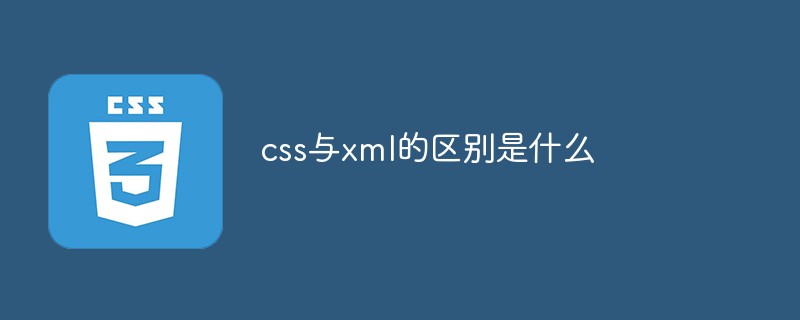 css与xml的区别是什么Apr 24, 2022 am 11:21 AM
css与xml的区别是什么Apr 24, 2022 am 11:21 AM区别是:css是层叠样式表单,是将样式信息与网页内容分离的一种标记语言,主要用来设计网页的样式,还可以对网页各元素进行格式化;xml是可扩展标记语言,是一种数据存储语言,用于使用简单的标记描述数据,将文档分成许多部件并对这些部件加以标识。
 css3怎么实现鼠标隐藏效果Apr 27, 2022 pm 05:20 PM
css3怎么实现鼠标隐藏效果Apr 27, 2022 pm 05:20 PM在css中,可以利用cursor属性实现鼠标隐藏效果,该属性用于定义鼠标指针放在一个元素边界范围内时所用的光标形状,当属性值设置为none时,就可以实现鼠标隐藏效果,语法为“元素{cursor:none}”。
 rtl在css是什么意思Apr 24, 2022 am 11:07 AM
rtl在css是什么意思Apr 24, 2022 am 11:07 AM在css中,rtl是“right-to-left”的缩写,是从右往左的意思,指的是内联内容从右往左依次排布,是direction属性的一个属性值;该属性规定了文本的方向和书写方向,语法为“元素{direction:rtl}”。
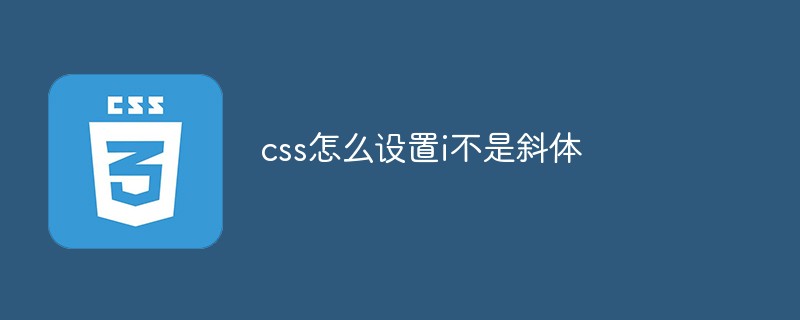 css怎么设置i不是斜体Apr 20, 2022 am 10:36 AM
css怎么设置i不是斜体Apr 20, 2022 am 10:36 AM在css中,可以利用“font-style”属性设置i元素不是斜体样式,该属性用于指定文本的字体样式,当属性值设置为“normal”时,会显示元素的标准字体样式,语法为“i元素{font-style:normal}”。
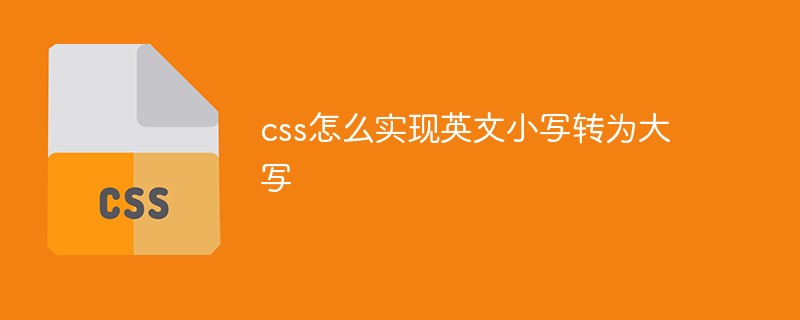 css怎么实现英文小写转为大写Apr 25, 2022 pm 06:35 PM
css怎么实现英文小写转为大写Apr 25, 2022 pm 06:35 PM转换方法:1、给英文元素添加“text-transform: uppercase;”样式,可将所有的英文字母都变成大写;2、给英文元素添加“text-transform:capitalize;”样式,可将英文文本中每个单词的首字母变为大写。
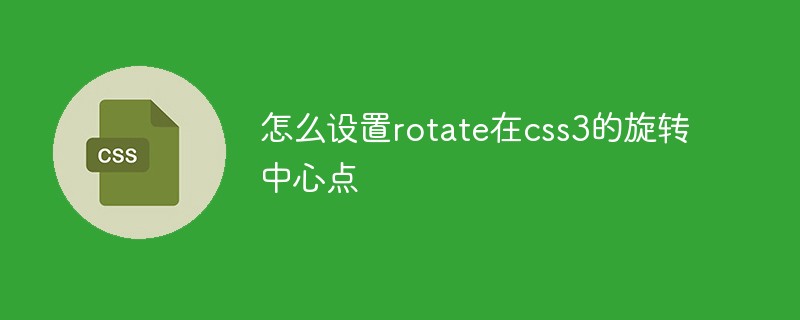 怎么设置rotate在css3的旋转中心点Apr 24, 2022 am 10:50 AM
怎么设置rotate在css3的旋转中心点Apr 24, 2022 am 10:50 AM在css3中,可以用“transform-origin”属性设置rotate的旋转中心点,该属性可更改转换元素的位置,第一个参数设置x轴的旋转位置,第二个参数设置y轴旋转位置,语法为“transform-origin:x轴位置 y轴位置”。


Hot AI Tools

Undresser.AI Undress
AI-powered app for creating realistic nude photos

AI Clothes Remover
Online AI tool for removing clothes from photos.

Undress AI Tool
Undress images for free

Clothoff.io
AI clothes remover

AI Hentai Generator
Generate AI Hentai for free.

Hot Article

Hot Tools

EditPlus Chinese cracked version
Small size, syntax highlighting, does not support code prompt function

SublimeText3 Linux new version
SublimeText3 Linux latest version

ZendStudio 13.5.1 Mac
Powerful PHP integrated development environment

Notepad++7.3.1
Easy-to-use and free code editor

SublimeText3 English version
Recommended: Win version, supports code prompts!




